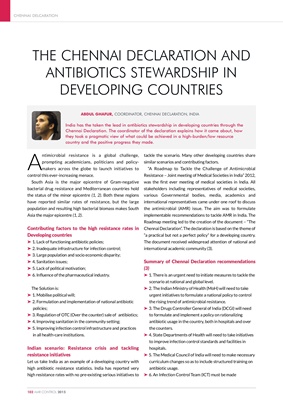
CHENNAI DELCARATION
102 AMR CONTROL 2015
A
ntimicrobial resistance is a global challenge,
prompting academicians, politicians and policymakers
across the globe to launch initiatives to
control this ever-increasing menace.
South Asia is the major epicentre of Gram-negative
bacterial drug resistance and Mediterranean countries hold
the status of the minor epicentre (1, 2). Both these regions
have reported similar rates of resistance, but the large
population and resulting high bacterial biomass makes South
Asia the major epicentre (1, 2).
Contributing factors to the high resistance rates in
Developing countries
‰ 1. Lack of functioning antibiotic policies;
‰ 2. Inadequate infrastructure for infection control;
‰ 3. Large population and socio economic disparity;
‰ 4. Sanitation issues;
‰ 5. Lack of political motivation;
‰ 6. Influence of the pharmaceutical industry.
The Solution is:
‰ 1. Mobilise political will;
‰ 2. Formulation and implementation of national antibiotic
policies;
‰ 3. Regulation of OTC (Over the counter) sale of antibiotics;
‰ 4. Improving sanitation in the community setting;
‰ 5. Improving infection control infrastructure and practices
in all health-care institutions.
Indian scenario: Resistance crisis and tackling
resistance initiatives
Let us take India as an example of a developing country with
high antibiotic resistance statistics. India has reported very
high resistance rates with no pre-existing serious initiatives to
tackle the scenario. Many other developing countries share
similar scenarios and contributing factors.
"A Roadmap to Tackle the Challenge of Antimicrobial
Resistance - Joint meeting of Medical Societies in India" 2012,
was the first ever meeting of medical societies in India. All
stakeholders including representatives of medical societies,
various Governmental bodies, media, academics and
international representatives came under one roof to discuss
the antimicrobial (AMR) issue. The aim was to formulate
implementable recommendations to tackle AMR in India. The
Roadmap meeting led to the creation of the document - "The
Chennai Declaration". The declaration is based on the theme of
"a practical but not a perfect policy" for a developing country.
The document received widespread attention of national and
international academic community (3).
Summary of Chennai Declaration recommendations
(3)
‰ 1. There is an urgent need to initiate measures to tackle the
scenario at national and global level.
‰ 2. The Indian Ministry of Health (MoH) will need to take
urgent initiatives to formulate a national policy to control
the rising trend of antimicrobial resistance.
‰ 3. The Drugs Controller General of India (DCGI) will need
to formulate and implement a policy on rationalizing
antibiotic usage in the country, both in hospitals and over
the counters.
‰ 4. State Departments of Health will need to take initiatives
to improve infection control standards and facilities in
hospitals.
‰ 5. The Medical Council of India will need to make necessary
curriculum changes so as to include structured training on
antibiotic usage.
‰ 6. An Infection Control Team (ICT) must be made
THE CHENNAI DECLARATION AND
ANTIBIOTICS STEWARDSHIP IN
DEVELOPING COUNTRIES
ABDUL GHAFUR, COORDINATOR, CHENNAI DECLARATION, INDIA
India has the taken the lead in antibiotics stewardship in developing countries through the
Chennai Declaration. The coordinator of the declaration explains how it came about, how
they took a pragmatic view of what could be achieved in a high-burden/low resource
country and the positive progress they made.